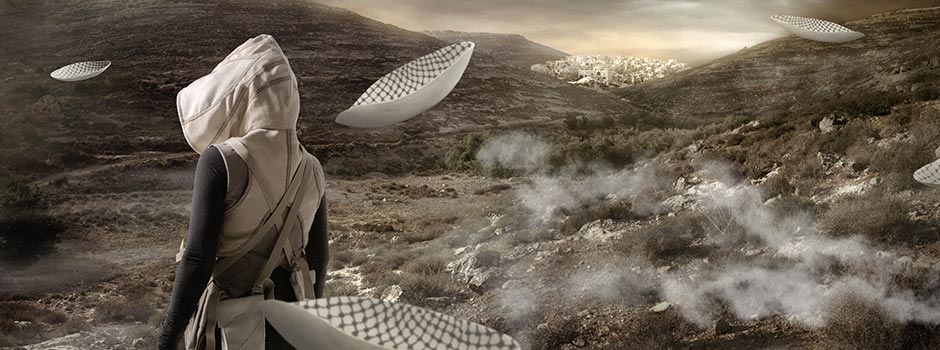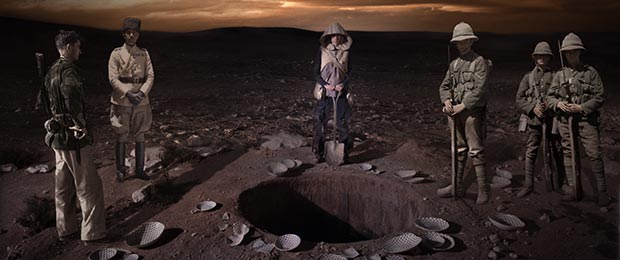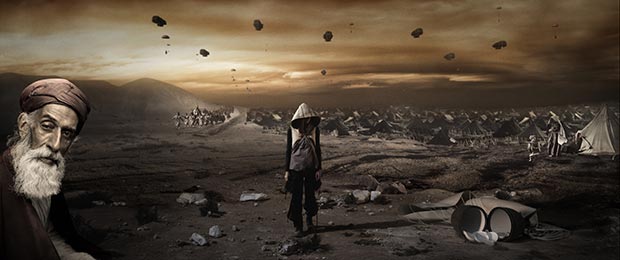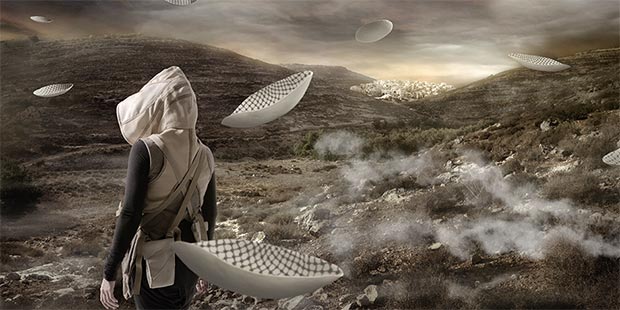
Second Solo Exhibition (Jan 18 – March 3, 2016) Lawrie Shabibi Presents Larissa Sansour ‘In The Future They Ate From The Finest Porcelain’
Jan 07, 2016 Exhibition

“In its most perverted form, archeology galvanizes public sentiment, confirms myths of the past and defends them against scrutiny†- from In the Future They Ate From The Finest Porcelain
The film is the artist’s longest to date, and the first in which she makes no appearance other than as the narrator’s voice. It is presented in colloquial Arabic as a dialogue voice-over. A female protagonist who describes herself as a “narrative terrorist†is questioned by her interlocutor, whose identity remains unknown and is open to speculation – is she a journalist, a psychiatrist or an interrogator? The film is a combination of sci-fi and archival imagery set against a deeply mesmerizing musical score and ambiguous time and place. At times it projects itself into the past and at others propels itself into the future with a view to creating a manufactured history.
 Larissa Sansour ‘In The Future They Ate From The Finest Porcelain’, 2014, Video still / Courtesy of Lawrie Shabibi
Larissa Sansour ‘In The Future They Ate From The Finest Porcelain’, 2014, Video still / Courtesy of Lawrie Shabibi
The protagonist tells of being part of a resistance group seemingly on the brink of the apocalypse where “archeology is the frontlineâ€. The weapons of this unknown opposition group are unconventional - elaborate porcelain decorated with the Kefiyyeh motif typically worn in Palestine and symbols of their decades of resistance. In the film’s most dramatic scene these porcelain pieces, which belong to an entirely fictional civilization,are delivered to their location and buried into the ground. A dark horizon is dotted with spaceships dropping bombs onto the open desert landscape that crack as they hit the ground,spilling out the plates. These are “the facts on the ground for future archeologists to excavateâ€, their aim to influence history and support future claims to their vanishing lands: once unearthed, this tableware will prove the existence of this people.
In her typical tongue-in-cheek fashion, Sansour looks at the politics of archeology and how myths of the past can become historic interventions with the power to create nationhood. In the Future They Ate From The Finest Porcelain depicts a desperate contest to establish territorial precedence as a means of survival when all else is lost. The film subtly alludes to the tactics of some Israeli groups, such the Elad Association, who make it their mission to strengthen their connection to Jerusalem through archeological digs and excavations and to assert the longevity of their people on the land. However no direct reference is made to this, Israel or its occupation, a departure from Sansour’s usual trajectory. Instead she presents her most universal film to date highlighting how the construction of national mythology can create and justify present identity, power and territorial claims. As Edward Said writes in Culture & Imperialism: "Appeals to the past are among the commonest of strategies in interpretations of the presentâ€.
 Larissa Sansour ‘In The Future They Ate From The Finest Porcelain’, 2014, Video still / Courtesy of Lawrie Shabibi
Larissa Sansour ‘In The Future They Ate From The Finest Porcelain’, 2014, Video still / Courtesy of Lawrie Shabibi
The exhibition will also include three large-scale photographs that are derived from the film. They feature archival images taken from Library of Congress' archives and UNRWA to make a pan-historical collection of both private individuals and representatives from the various occupying forces in Palestine through the ages, from the time of the Ottomans, that of the British Mandate and the present era under Israel. Finally Larissa Sansour will present an installation depicting an assembly line that appears to have been abandoned half way through the creation of the fictional porcelain plates. Deliberately crude, the work highlights how our past can be systematically controlled and fabricated.
‘In the Future They Ate From the Finest Porcelain’ opens on January 18 and continues until March 3, 2016. The film lasts minutes 28 minutes and will screen on the hour then half hour.
Note: 'In the Future They Ate From the Finest Porcelain' co-produced and co-directed with Søren Lind andco-commissioned by FLAMIN Productions through Film London Artists' Moving Image Network with funding from Arts Council England; New Art Exchange; Bluecoat, Liverpool; Wolverhampton Art Gallery, Wolverhampton; and The Mosaic Rooms, A.M.Qattan Foundation, London; with support from Doha Film Institute; The Danish Arts Council, Arts Council England, Iambic Film, KnudHøjgaards Fond and Contemporary Art Platform – Kuwait. Produced by Spike Film and Video, Bristol.
 Larissa Sansour ‘In The Future They Ate From The Finest Porcelain’, C print face mounted on perspex, 100x200 cm / Courtesy of Lawrie Shabibi
Larissa Sansour ‘In The Future They Ate From The Finest Porcelain’, C print face mounted on perspex, 100x200 cm / Courtesy of Lawrie Shabibi
Sansour was born in Jerusalem and studied Fine Art in Copenhagen, London and New York. She has held a number of solo exhibitions including Nation Estate, Montoro 12, Rome, 2015; Nation Estate, Al Ma-mal, Jerusalem, 2015; Nation Estate, Wolverhampton Art Gallery, UK, 2014; Larissa Sansour, Gallery Dock, Bratislava, Slovakia, 2014; Nation Estate, Museum of Contemporary Art, Turku, Finland, 2013; Science Faction, Lawrie Shabibi, Dubai, UAE, 2013; Living the Highlife, Centre of Photography, Copenhagen, 2012; and Falafel Roadat Depo, Istanbul, 2011.
She has participated in the Liverpool Biennale, 2010; Istanbul Biennale, 2009; Third Guangzhou Triennial in China, 2008 and LOOP, Seoul, 2010. She has exhibited in a variety of international museums and institutions most notably CentQuatre, Paris (2014); the Centre for Photography, Copenhagen, 2012; Cornerhouse, Manchester, 2012; Museum of Contemporary Art, Denmark, 2011; Hiroshima MOCA, Japan, 2011; Museum of Contemporary Art, Roskilde, Denmark, 2010; Iniva, London, 2010, Al Ma'mal, Jerusalem, 2007; and Tate Modern, London, 2007. Her works are part of notable collections including the Wolverhampton Gallery, UK, the Imperial War Museum, UK, the Carlsberg Foundation, Denmark, the Museum of Contemporary Art, Denmark, N.B.K., Germany, Nadour, Germany, Salsali Private Museum, UAE and the BarjeelArt Foundation, UAE.
In 2015, Sansour's sci-fi short 'In The Future, They Ate From The Finest Porcelain' was nominated for the Muhr Short Competition organised by the Dubai International Film Festival (DIFF). She was invited as an artist in residence with the Moving Museum, Istanbul for three weeks in September 2014. Sansour currently lives and works between London and Copenhagen.
Lawrie Shabibi is a contemporary art gallery housed in Dubai's Alserkal Avenue. The gallery supports the long-term development of the careers of young international contemporary artists with a focus on those from the Middle East and North Africa. The gallery also organizes art historical exhibitions working with an older generation of artists from the region. Liaising with curators, institutions, museums and collectors the gallery has successfully introduced international artists to the region whilst at the same time presented Middle Eastern artists to the international contemporary arts community. By holding a regular programme of exhibitions, screenings and talks, publishing catalogues and participating in international art fairs, Lawrie Shabibi has in the space of five years been a forerunner in the development of the contemporary art scene in Dubai.
Comments
Add a comment